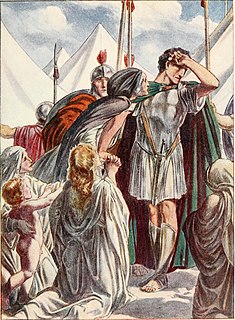
Marcus Porcius Cato, also known as Cato the Censor, the Elder and the Wise, was a Roman soldier, senator, and historian known for his conservatism and opposition to Hellenization. He was the first to write history in Latin with his Origines, a now lost work on the History of Rome. His work De agri cultura, a rambling work on agriculture, farming, rituals, and recipes, is the oldest extant prose written in the Latin language. His epithet "Elder" distinguishes him from his equally famous great-grandson Cato the Younger, who opposed Julius Caesar.

The gens Livia was an illustrious plebeian family at ancient Rome. The first of the Livii to obtain the consulship was Marcus Livius Denter in 302 BC, and from his time the Livii supplied the Republic with eight consuls, two censors, a dictator, and a master of the horse. Members of the gens were honoured with three triumphs. In the reign of Augustus, Livia Drusilla was Roman empress, and her son was the emperor Tiberius.
The gens Sulpicia was one of the most ancient patrician families at ancient Rome, and produced a succession of distinguished men, from the foundation of the Republic to the imperial period. The first member of the gens who obtained the consulship was Servius Sulpicius Camerinus Cornutus, in 500 BC, only nine years after the expulsion of the Tarquins, and the last of the name who appears on the consular list was Sextus Sulpicius Tertullus in AD 158. Although originally patrician, the family also possessed plebeian members, some of whom may have been descended from freedmen of the gens.

The gens Fabia was one of the most ancient patrician families at ancient Rome. The gens played a prominent part in history soon after the establishment of the Republic, and three brothers were invested with seven successive consulships, from 485 to 479 BC, thereby cementing the high repute of the family. Overall, the Fabii received 45 consulships during the Republic. The house derived its greatest lustre from the patriotic courage and tragic fate of the 306 Fabii in the Battle of the Cremera, 477 BC. But the Fabii were not distinguished as warriors alone; several members of the gens were also important in the history of Roman literature and the arts.
Quintus Fabius Pictor was the earliest known Roman historian. His history, written in Greek and now mostly lost besides some surviving fragments, was highly influential on ancient writers and certainly participated in introducing Greek historiographical methods to the Roman world. However, the work was highly partisan towards Rome, blaming the Second Punic War on Carthage and idealizing the Roman Republic as a well-ordered state loyal to its allies. Fabius probably served as praetor, was a member of the Senate, and participated in a delegation sent to the oracle at Delphi in 216 BC. Some scholars consider him one of the earliest annalists, although this conclusion has been criticized.
Quintus Claudius Quadrigarius was a Roman historian. Little is known of Q. Claudius Quadrigarius's life, but he probably lived in the 1st century BC.
Annals are a concise historical record in which events are arranged chronologically, year by year, although the term is also used loosely for any historical record.

The book History of Rome, sometimes referred to as Ab Urbe Condita Libri, is a monumental history of ancient Rome, written in Latin between 27 and 9 BC by the historian Titus Livius, or "Livy", as he is usually known in English. The work covers the period from the legends concerning the arrival of Aeneas and the refugees from the fall of Troy, to the city's founding in 753, the expulsion of the Kings in 509, and down to Livy's own time, during the reign of the emperor Augustus. The last event covered by Livy is the death of Drusus in 9 BC. 35 of 142 books, about 25% of the work, are still extant. The surviving books deal with the events down to 293 BC, and from 219 to 166 BC.

The gens Marcia, occasionally written Martia, was one of the oldest and noblest houses at ancient Rome. They claimed descent from the second and fourth Roman Kings, and the first of the Marcii appearing in the history of the Republic would seem to have been patrician; but all of the families of the Marcii known in the later Republic were plebeian. The first to obtain the consulship was Gaius Marcius Rutilus in 357 BC, only a few years after the passage of the lex Licinia Sextia opened this office to the plebeians.
Origines is the title of a lost work on Roman and Italian history by Cato the Elder, composed in the early-2nd century BC.
The gens Lutatia, occasionally written Luctatia, was a plebeian family of ancient Rome. The first of the gens to obtain the consulship was Gaius Lutatius Catulus in 242 BC, the final year of the First Punic War. Orosius mentions their burial place, the sepulchrum Lutatiorum, which lay beyond the Tiber.
The gens Terentia was a plebeian family at ancient Rome. Dionysius mentions a Gaius Terentilius Arsa, tribune of the plebs in 462 BC, but Livy calls him Terentilius, and from inscriptions this would seem to be a separate gens. No other Terentii appear in history until the time of the Second Punic War. Gaius Terentius Varro, one of the Roman commanders at the Battle of Cannae in 216 BC, was the first to hold the consulship. Members of this family are found as late as the third century AD.
The gens Sempronia was one of the most ancient and noble houses of ancient Rome. Although the oldest branch of this gens was patrician, with Aulus Sempronius Atratinus obtaining the consulship in 497 BC, the thirteenth year of the Republic, but from the time of the Samnite Wars onward, most if not all of the Sempronii appearing in history were plebeians. Although the Sempronii were illustrious under the Republic, few of them attained any importance or notice in imperial times.
Roman historiography stretches back to at least the 3rd century BC and was indebted to earlier Greek historiography. The Romans relied on previous models in the Greek tradition such as the works of Herodotus and Thucydides. Roman historiographical forms are usually different from their Greek counterparts, however, and often emphasize Roman concerns. The Roman style of history was based on the way that the Annals of the Pontifex Maximus, or the Annales Maximi, were recorded. The Annales Maximi include a wide array of information, including religious documents, names of consuls, deaths of priests, and various disasters throughout history. Also part of the Annales Maximi are the White Tablets, or the "Tabulae Albatae", which consist of information on the origin of the Roman Republic.
Lucius Calpurnius Piso Frugi was a Roman politician and historian of plebeian origin, consul in 133 BC and censor in 120 BC.
Lucius Cincius Alimentus was a celebrated Roman annalist, jurist, and provincial official. He is principally remembered as one of the founders of Roman historiography, although his Annals has been lost and is only known from fragments in other works.
The gens Cincia was a plebeian family at Rome. The first member of the gens to achieve prominence was Lucius Cincius Alimentus, who was elected praetor in 209 BC.

Gnaeus Gellius was a Roman historian. Very little is known about his life and work, which has only survived in scattered fragments. He continued the historical tradition set by Fabius Pictor of writing a year-by-year history of Rome from mythological times to his day. However, with about a hundred books, Gellius' Annales were massively more developed than the other Roman annalists, and was only surpassed by Livy's gigantic History of Rome.
The gens Domitia was a plebeian family at ancient Rome. The first of the gens to achieve prominence was Gnaeus Domitius Calvinus, consul in 332 BC. His son, Gnaeus Domitius Calvinus Maximus, was consul in 283, and the first plebeian censor. The family produced several distinguished generals, and towards the end of the Republic, the Domitii were looked upon as one of the most illustrious gentes.
The gens Magia was a plebeian family at ancient Rome. Members of this gens are first mentioned at the time of the Second Punic War. Although several of them performed useful service to the Roman state, none of the Magii ever held the consulship.





